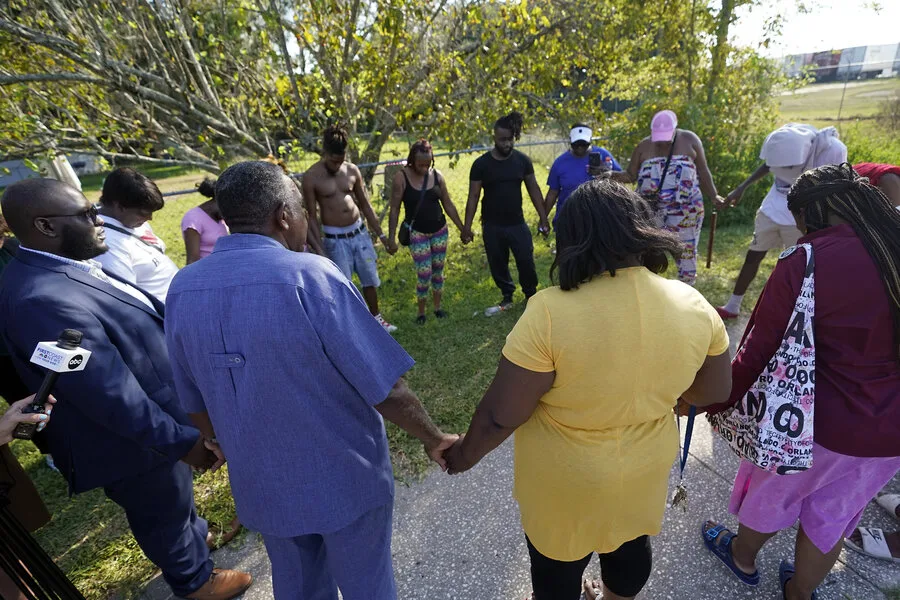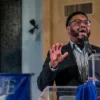
The pastor of a church near the site of the racist fatal shooting of three Black people told congregants Sunday to follow Jesus Christ’s example and keep their sadness from turning to rage.
The shooting devastated a historically Black neighborhood in Jacksonville Saturday as thousands visited Washington, D.C., to attend the Rev. Al Sharpton’s 60th anniversary commemoration of the 1963 March on Washington for Jobs and Freedom, where the Rev. Martin Luther King Jr. delivered his historic “I Have A Dream” speech.
The latest in a long history of American racist killings was at the forefront of Sunday services at St. Paul AME Church, about 3 miles from the crime scene.
“Our hearts are broken,” the Rev. Willie Barnes told about 100 congregants Sunday morning. “If any of you are like me, I’m fighting trying to not be angry.”
The choir sang “Amazing Grace” before ministers said prayers for the victims’ families and the broader community. From the pews, congregants with heads bowed answered with “amen.”
A masked white man carried out the shooting with at least one weapon bearing a swastika inside a Dollar General store, leaving two men and one woman dead.
The shooting happened just before 2 p.m. within a mile of Edward Waters University, a small, historically Black university. In addition to carrying a firearm painted with a symbol of Germany’s Nazi regime of the 1930s and 1940s, the shooter issued racist statements before the shooting. He killed himself at the scene.
“He hated Black people,” Jacksonville Sheriff T.K. Waters said.
The gunman, who was in his 20s, wore a bullet-resistant vest and used a Glock handgun and an AR-15 semi-automatic rifle. He acted alone and there was no evidence that he was part of a group, Mr. Waters said.
Officials said the shooter wrote statements to federal law enforcement and the media that contained evidence suggesting that the attack was intended to mark the fifth anniversary of the murder of two people during a video game tournament in Jacksonville by a shooter who also killed himself.
Officials did not immediately release the names of the victims or the gunman on Saturday. Local media identified a man believed to be the shooter but his identity was not independently confirmed by The Associated Press by early Sunday.
The university said in a statement that a security officer had seen the man near the school’s library and asked for identification. When the man refused, he was asked to leave and returned to his car. He was spotted putting on the bullet-resistant vest and a mask before leaving the grounds, although it was not known whether he had planned an attack at the university, Mr. Waters said.
“I can’t tell you what his mindset was while he was there, but he did go there,” the sheriff said.
Shortly before the attack, the gunman sent his father a text message telling him to check his computer, where he found his writings. The family notified 911, but the shooting had already begun, Mr. Waters said.
“This is a community that has suffered again and again. So many times this is where we end up,” Mayor Donna Deegan said.
Rudolph McKissick, a national board member of the Rev. Al Sharpton’s National Action Network, Baptist bishop, and senior pastor of the Bethel Church in Jacksonville, was in Jacksonville on Saturday when the shooting occurred in the historically Black New Town neighborhood
“Nobody is having honest, candid conversations about the presence of racism,” Mr. McKissick said.
Florida Gov. Ron DeSantis, who spoke with the sheriff by phone from Iowa while campaigning for the Republican presidential nomination, called the shooter a “scumbag.”
“This guy killed himself rather than face the music and accept responsibility for his actions. He took the coward’s way out,” Mr. DeSantis said.
Mr. McKissick, the Jacksonville pastor, said that Mr. DeSantis’ politics were contributing to racial tensions in Florida.
“This divide exists because of the ongoing disenfranchisement of Black people and a governor, who is really propelling himself forward through bigoted, racially motivated, misogynistic, xenophobic actions to throw red meat to a Republican base,” Mr. McKissick said.
Past shootings targeting Black Americans include one at a Buffalo, New York, supermarket in 2022 and a historic African Methodist Episcopal church in Charleston, South Carolina, in 2015.
The Buffalo shooting, which killed 10 people, stands apart as one of the deadliest targeted attacks on Black people by a lone white gunman in U.S. history. The shooter was sentenced to life in prison without the possibility of parole.
The Jacksonville shooting came a day before the 63rd anniversary of the city’s notorious “Ax Handle Saturday,” when 200 Ku Klux Klan members attacked Black protesters conducting a peaceful sit-in against Jim Crow laws banning them from white-owned stores and restaurants.
The police stood by until a Black street gang arrived to fight the Klansmen, who were armed with bats and ax handles. Only Black people were arrested.
Jacksonville native Marsha Dean Phelts was in Washington with others at the King commemoration and lives at Amelia Island, an African American beach community established in 1935 as a result of segregation.
“We could not go to public parks and public beaches,” she recalled. “You did not have access to things that your taxes pay for.”
“We took this long journey from Jacksonville, Florida, to be a part of history,” said LaTonya Thomas another Jacksonville resident riding a charter bus home after the Washington commemoration.
This story was reported by The Associated Press. AP writers John Raoux in Jacksonville, Florida, Terry Spencer in Fort Lauderdale, Florida, Trisha Ahmed in St. Paul, Minnesota, and Mike Balsamo in Washington contributed to this report.


